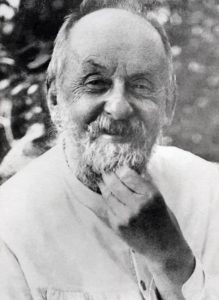
A true atom is unknown. One thing is observed: the simpler the atom, the more difficult its disintegration is. The most massive atoms decay in thousands of years and even less. Less massive ones – in billions of years. Even more common – in billions, trillions and decillions of years. Particles of hydrogen and aether may be of this kind.
Matter is a carrier of sense, since there is nothing but matter. What then we can attribute a feeling to? Where the matter is, where the atom is, there is a feeling. Atom or a part of it can be called primal (primitive), or simple, spirit, but, as we have seen, each atom is a composition of the simplest. Destiny of an unknown simplest one depends on participation of the atoms known to science.*
There are as many true atoms, as there are primal spirits. A primal spirit wanders through the universe and forms unions. We recognize only unions in the world. Life and feeling of an atom depends on the complexity of the union, which it is in: the more complex the union is, the more complex the activity and feeling of the atom. Here is a rough representation of gradually increasing complexity of an atom’s life.
